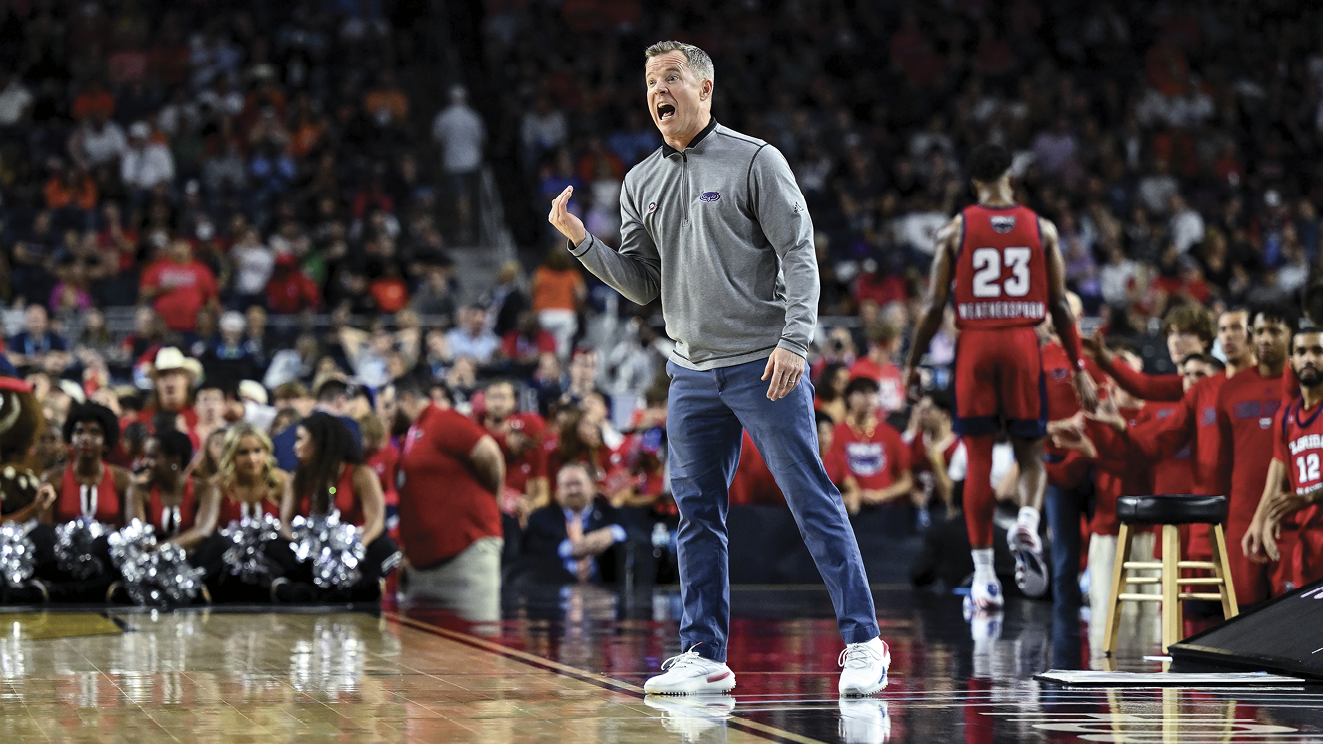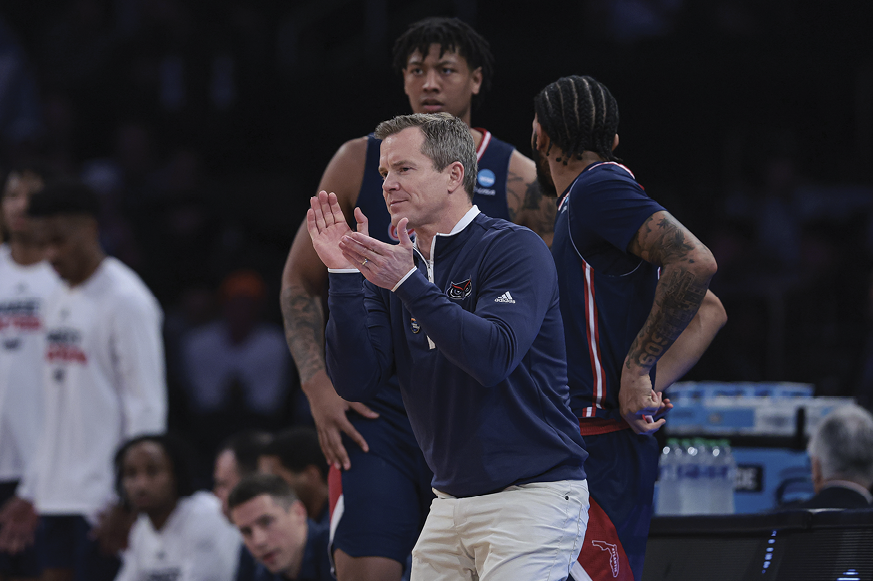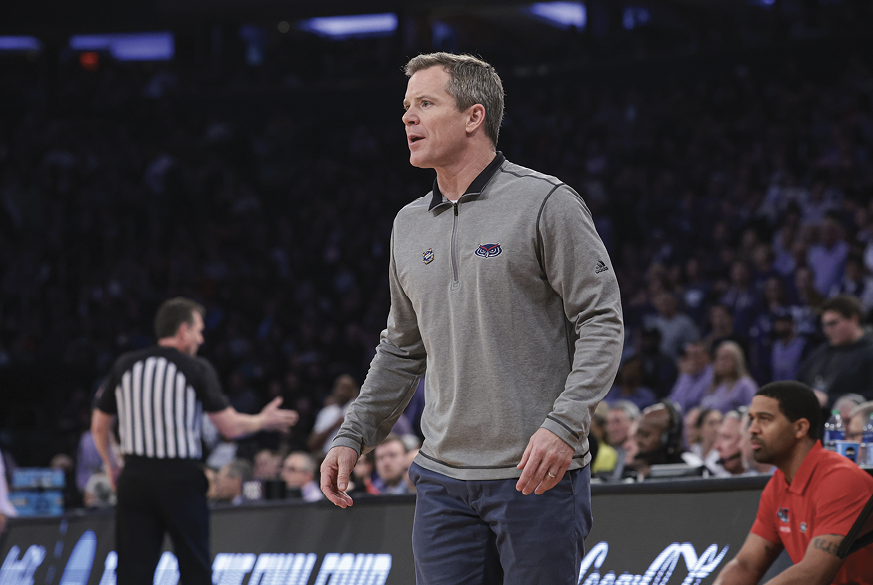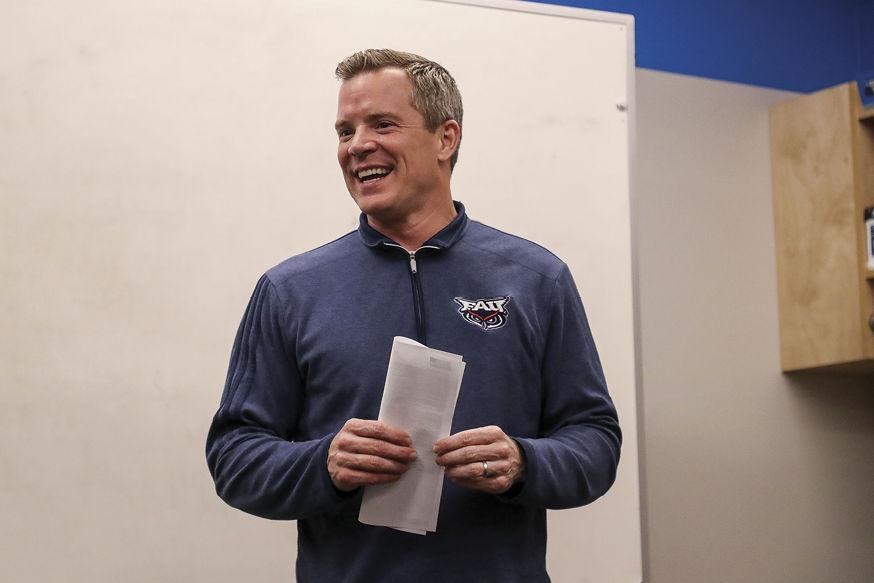- Home
- Media Kit
- MediaJet
- Current Issue
- Past Issues
- Ad Specs-Submission
- Ad Print Settings
- Reprints (PDF)
- Photo Specifications (PDF)
- Contact Us
- PRIVACY POLICY
- TERMS OF USE
![]()
ONLINE
![]()
ONLINE

A Love of the Game
Editors’ Note
Dusty May led Florida Atlantic to what is undoubtedly its greatest season in school history in the 2022-23 campaign. May guided the Owls to the Final Four while posting a program-best 35-4 record. Prior to this season, the Owls had one previous appearance in the NCAA Tournament, but this year, May led the Owls to not just their first win in the big dance, but all the way to the Final Four in Houston. In April 2023, May and Florida Atlantic reached an agreement on a 10-year contract extension.
May’s resume is well-decorated, as he was named the CBS Sports National Coach of the Year, as well as the NABC All-District 17 Coach of the Year and Conference USA Coach of the Year this season. May is the Owls’ all-time leader in coaching wins with a record of 101-60, despite having only been on the FAU sidelines for five seasons. FAU has not had a losing season in the five years of the May era. The Owls also captured the Conference USA Tournament and Regular Season Championships, both for the first time in school history. Under May’s guidance, the 2022-23 Owls have the most wins in school history, the most conference wins in school & C-USA history, the longest winning streak in school history, and the third-longest streak in C-USA history.
Prior to becoming Head Coach, May spent the previous seven seasons on Mike White’s coaching staffs, first at Louisiana Tech University for four seasons and then with the University of Florida. White is the older brother of Brian White, who was named FAU’s vice president and director of athletics in March 2018.
May joined FAU after three years as an assistant coach at Florida, where he helped the Gators compile a 69-37 record, including back-to-back NCAA Tournament appearances. He was retained as an assistant at Louisiana Tech when Mike White took over the program entering the 2011-12 season, and the Bulldogs won three straight conference championships – the Western Athletic Conference title in 2013 and C-USA crowns in 2014 and 2015. May served six seasons (2009-15) as assistant coach and associate head coach at Louisiana Tech. In his final season with the Bulldogs, the team went 27-9, including 15-3 in C-USA to win the regular season championship by two games, and went 17-0 on its home court.
May was a student manager for the Indiana University men’s basketball team and after graduating, he began his professional career as an administrative assistant/video coordinator at USC from 2000-02. He returned to Indiana in an administrative role for three seasons before taking his first step as an assistant coach with Eastern Michigan (2005-06). He has also served as an assistant at Murray State (2006-07) and UAB (2007-09).

Dusty May during the Men’s Final Four semi-final game
between the FAU Owls and the San Diego State Aztecs
at NRG Stadium in Houston, Texas
Will you discuss your journey in coaching?
I started playing basketball in elementary school and fell in love with the game immediately, and since as early as I can remember, I always wanted to be a coach because of the impact that my coaches had on me. There have been many ups and down on my coaching journey, and at several points in my career I thought about going in another direction because of my family. My wife and I had three children when we were young, and there were a lot of times when it was challenging to be a good father, a good husband, and give to my career the way I needed to if I was going to continue to grow in the profession. My wife and kids were always very supportive, and I was able to work for great people. I caught a few breaks along the way and was able to keep climbing – it has been a great ride.

Dusty May and sophomore guard Alijah Martin after winning
the Conference USA Tournament Championship
How important were mentors during your early years in coaching?
Early in my career, Coach Knight (Indiana University) was someone that I would ask for advice on career moves, and later on the head coaches that I worked for were all great coaches to learn from. I leaned on a lot of the assistant coaches for advice and direction because they were closer to where I was, and they were where I was trying to get to. For me, being a head coach was a long-term goal, so I leaned on the assistant coaches that I was working under or working with for advice. As I got older, Mike White, who I served as an assistant under at Louisiana Tech and Florida during my career, was someone I could always go to for advice and feedback. I have been very fortunate throughout my career to work with and for people who took the time to get to know me and gave their time to support me.
What was it like in the early days at Florida Atlantic as you looked to build the program into a national contender?
It was all about the work and the challenge. We were faced with adversity, but it is how you respond to adversity that determines your success. This is what we teach to our players. It is not always going to be smooth and easy, but it is about making the best of it and finding solutions to the problems. My focus was on finding the best players to recruit, and putting together a coaching staff and a team that was going to pull together in the same direction.
“We were faced with adversity, but it is how you respond to adversity that determines your success. This is what we teach to our players.”
While you are always looking to recruit the best talent, how important is personality and culture fit as part of the process?
We value character, drive, and determination. Clearly, they must be talented basketball players or we would not be recruiting them in the first place, but once we identify those players it becomes a deep dive into evaluating whether they will fit with our values and mission. We have great human beings throughout our program, and I find that great people tend to gravitate towards great people which has made it happen somewhat organically. I believe as people we are all attracted to certain types of relationships.
What are the qualities you look for in your coaching staff?
I go to many NBA games and see times when there is very little interaction between the head coach and the staff, which is not my philosophy. I value the opinions and experiences of our staff, and I rely on them heavily. Our staff is not concerned about getting credit or hearing their names in the news – it is about working together as a team which trickles down to our players. It is about each of us working to make the other person better, and this permeates throughout our program. It is about putting the team ahead of yourself.

Dusty May during the NCAA Sweet 16 game against
Tennessee at Madison Square Garden
What led to the success of the team this season in reaching the Final Four?
We felt that we received some bad breaks last year with injuries, as well as on certain nights finding ways to lose – we were young and we were gaining experience. This year we brought back the same team and we were confident that if we continued to improve, we would get over the hump. Our hardest workers were also our most natural leaders which was a key to our success. It takes great locker room leadership and we had that this year.
Now it is about being even hungrier as we look to next season if we are going to continue our success. Since the season ended, I have said that the first thing you are concerned with is complacency, but we have a group that enjoys working and loves to compete so I am confident that we will continue to do what we need to achieve success.

Dusty May during the NCAA Elite 8 game against
Kansas State at Madison Square Garden
How important is it to maintain your relationships with your players after their playing days are over?
This is extremely important, and it is a reason why we are so focused on continuity in our program. We have brought back a former player who is on our staff now, and we stay in close contact with our players. We are about our players, not just when they are playing for us, but throughout their lives. The messages we are teaching our players are for today, as well as for the next 50 years of their lives. These kids put their heart and soul into the program, and we feel a responsibility to be there for them long after their playing days are finished.

Dusty May in the locker room after the
Owls’ NCAA Sweet 16 win over Tennessee
What are your views on the state of college basketball today and the impact of the transfer portal and NIL?
The transfer portal concerns me since if you are going to bounce around from school to school, you will lose credits and it will impact graduation for these young athletes. I can only focus on my job of providing the best situation for the short and long term for our players, and hopefully they will not want to look for something else. Many players are used to moving around during high school and on their AAU teams, so they are comfortable with change and experiencing new places, but as long as we are providing a learning environment and are setting them up for success in life after basketball, we hope that they will value that and stay with us.
I think that NIL deals are great for players as they are learning business and entrepreneurship. I think there are areas that need to be watched and adapted, but for the most part this is a positive for players.
Are you able to take moments to reflect on the success of this year and appreciate what the team accomplished?
I am focused on next year and raising the bar. I have spent very little time reflecting on last season, other than watching the games again and reliving the feelings that I had in those moments. It is about looking forward to having another great season and staying ahead in the constantly changing landscape of the profession.![]()